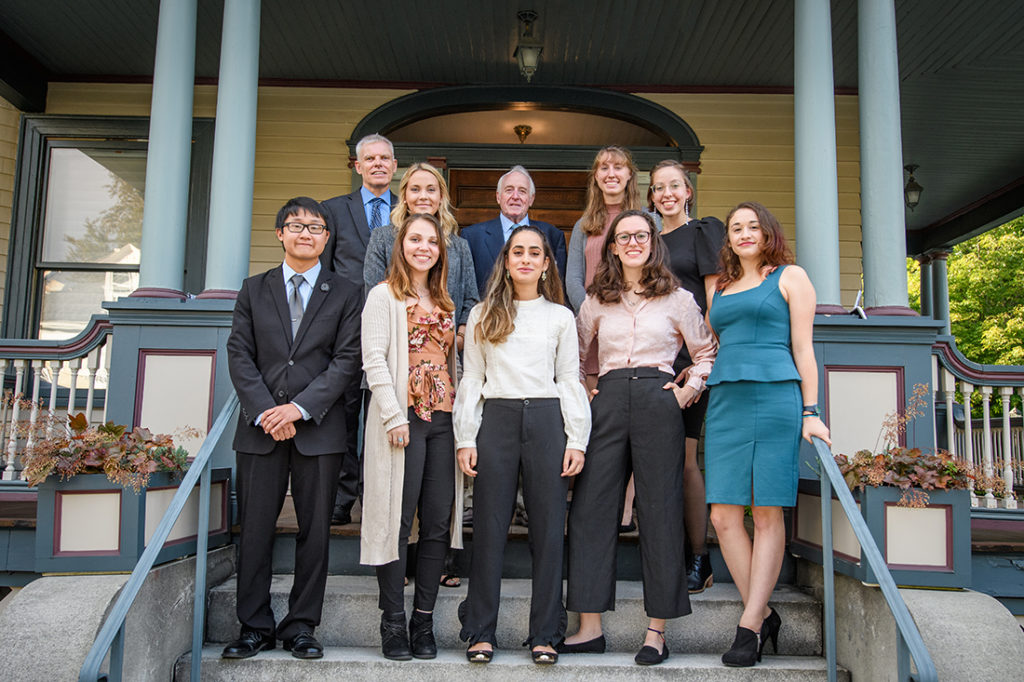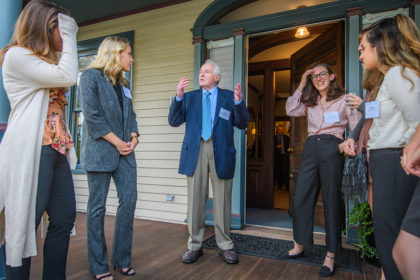Steinbrecher Fellows feted following a summer of research, service

Clark University’s Steinbrecher Fellows were honored at a Sept. 11 dinner at Harrington House, where they presented projects that allowed them to study the kettle ponds of Cape Cod, explore the great art galleries of Europe, compose music in a picturesque French village, and interview a Holocaust survivor who teaches a difficult and valuable lesson about forgiveness.

The Steinbrecher Fellowship Program encourages and supports Clark undergraduates’ pursuit of original ideas, creative research, and community service projects. Steve Steinbrecher ’55, who funds the program, told the students that they are “a very special group” whose research and service learning spans multiple disciplines and countries.
This year’s Steinbrecher recipients and their projects:
Toni Armstrong ’19 explored the choices that exhibition designers make when creating modern art galleries, and how these choices inform audience understanding. She visited more than 40 art museums in 11 European countries and blogged about her impressions of the exhibits and their designers. Armstrong majors in art history and ancient civilization; her faculty sponsor is Kristina Wilson, professor of art history. (Read a story about Toni Armstrong.)
Cory Bisbee ’19 created an electronic repository of information on South Korea’s elite political figures, offices, and state bodies, and built the information into a curated web platform. He researched, translated, and populated the website, and has worked to make it a dynamic, searchable resource. “This is something that never previously existed, outside of a wide range of newspaper articles,” he said. Bisbee majors in political science and Asian studies; his faculty sponsor is Suzanne Scoggins, assistant professor of political science.
Iolanthe Brooks ’19 researched how the process of relocating a prisoner to an alternative corrections facility affects the incarcerated person — specifically if transportation/relocation is used as an additional form of punishment. She interviewed people in the New York City area who had been incarcerated, as well as lawyers, advocates, and activists, and gathered data about transfer numbers. She expects to put her analysis into an honors thesis by the end of next semester. Brooks majors in sociology; her faculty sponsor is Patricia Ewick, professor of sociology.
Casey Bush ’19 traveled to the CANDLES (Children of Auschwitz Nazi Deadly Lab Experiments Survivors) Holocaust Museum in Terre Haute, Indiana, to interview founder Eva Kor about her decision to publicly forgive Nazi doctor Josef Mengele, who performed experiments on Kor and her twin sister during World War II. “[Eva] forgives because she doesn’t want to be a victim,” Bush said. “She also forgives Nazis because she wants the perpetrators to come clean about what they did.” Bush majors in history, with a concentration in Holocaust and genocide studies; her faculty sponsor is Thomas Kuehne, director of the Strassler Center for Holocaust and Genocide Studies. (Read a story about Casey Bush.)
Linnea Menin ’19 used molecular and bioinformatic methods to understand the little known microbial communities in a dozen kettle ponds on Cape Cod and in Walden Pond. She conducted nutrient analyses to determine how changes in nutrient levels — often from human activity — impact microbial communities. Menin majors in biology; her faculty sponsor is Nathan Ahlgren, assistant professor of biology.
Sydney Pepper ’19 served as an administration intern and fellow for the Etchings Festival in Auvillar, France. She learned about nonprofit arts management and received additional training in music composition and conducting. “I was forced out of my comfort zone,” says Pepper, who composed a piece of music with the guidance of professional musicians. Pepper majors in music and English; her faculty sponsor is John Aylward, composer, associate professor of music composition and theory, and founder of the Festival.
Salma Shawa ’19 will travel to South Africa over winter break to collect personal stories about how the former apartheid regime affected social relationships. Her honors thesis will compare the impact of South African policies during apartheid with policies implemented by Israel in Palestinian territories. Shawa majors in political science; her faculty sponsor is Michael Butler, associate professor of political science.
Maggie Tarbox ’19 interned with Project Limestone, a nonprofit organization in Nassau, Bahamas, which helps children ages 8 to 18 improve their academic performance and provides them with team building and community engagement skills. Tarbox created curriculum frameworks and worked with area children. “It was empowering for me because I had an impact on Limestone’s infrastructure,” she said. Tarbox majors in history; her faculty sponsor is Melissa Butler, instructor in the Department of Sociology.
Max De Faria ’20, who was unable to attend the dinner, traveled to Santiago, Chile, to examine the prevalence of food inaccessibility across regions and neighborhoods in the city. De Faria majors in geography and Spanish; his faculty sponsor is Rinku Roy Chowdhury, professor in the School of Geography.


